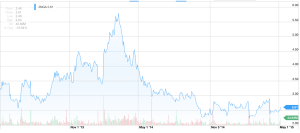About two years ago, Mark Pincus brought on former Xbox executive Don Mattrick to run the company, and he took a step back. This was actually a tremendous surprise to the industry.
Pincus has a reputation of being a bit of a micro manager and is not often able to delegate responsibility or empower his lieutenants. It was seen as a change in direction for Zynga, which became one of the most successful gaming companies in the world on the strength of its Facebook games. It seemed the company would go from an analytically driven social gaming company driven by virality to, essentially, a more traditional gaming company in the vein of Electronic Arts and Activision-Blizzard.
Then, in a very unsurprising move, Mark Pincus came back and took over the company about two years later; Mattrick left last month. Pincus’ attempt at divorcing himself from the company was unsuccessful — though he certainly had checked out for a short period of time and started an incubator of sorts. When Zynga announced that Pincus would return as CEO, the company’s stock promptly fell about 18 percent.
Zynga also cut 18 percent of its staff, the company disclosed in its earnings report today. In an interview given to Re/code as part of the release of the company’s earnings, Pincus said the company “identified a couple places where we want to be world-class, like data analytics.” With Pincus back at the helm, it seems like, once again, there’s going to be a shift in the direction and nature of the company.
It feels very much like one of the classic moves that Pincus is known for — and one, it seems, that was necessary in the eyes of shareholders. Shares of Zynga rose more than 6 percent after beating expectations and news of the layoffs. Pincus told Re/code he is also slashing that staff from corporate and central services and is exiting the sports genre.
That data-driven nature served Zynga very well during the Facebook era, as the company’s ability to propel the virality and revenue of its games made it a tech darling and led to one of the largest tech IPOs since Google. Zynga’s greatest strength, in particular, was that it built a playbook that was able to produce another viral hit as a prior was was beginning to fade. As FarmVille entered its twilight years, the company came out with CityVille, which became a major success.
Pincus’ analytical focus was ever-present within the gaming company. In “greenlight” meetings (which determine what games move on to full development) Pincus was known for relentlessly asking questions about how well a game could monetize and how it could engineer virality, according to insiders I’ve spoken to over the years.
That’s great for business, but according to insiders, it was also seen as a barrier to creativity. In an industry that was very hit-driven, it wasn’t clear that the playbook that worked on Facebook would continue to succeed.
As most gaming shifted to mobile devices, Zynga was caught flat-footed with few truly viral mobile titles and a playbook that only worked on the web and Facebook. The company was usurped by mobile-first companies like Supercell and King.com, as well as games like Clash of Clans and Candy Crush Saga. The notion of virality was dramatically different, and the focus shifted to games that were high-quality, natively mobile and social in a way that worked well on mobile devices.
That’s when Mattrick was brought in, to shift the company to one that was mobile-focused that looked much more like a gaming studio than an analytics company that happened to make money off games. Shareholders were initially very pleased with the decision — it was clear that Zynga needed a change in direction. But, to be sure, Mattrick’s strategy also didn’t seem to be working.

In the years prior to his departure, the role of Pincus’ lieutenant was essentially a revolving door, regularly seeing new stars to rise only to promptly lose their power and depart the company. EA alumnus John Schappert was brought on to help the company go public, but was then subsequently replaced by David Ko, who was known for his strong business sense.
Then, when Mattrick came in, Ko departed after being passed over for the CEO role. The company’s last COO, Clive Downie, left in April after Pincus took over.
Pincus’ moves show that he is still in deep control of — and deep love with — Zynga, and wants the company to continue operating. It’s probably for good reason: He built Zynga from the ground up into one of the most successful gaming companies in the world with a strategy that was essentially orthogonal to what most gaming companies were doing at the time.
Is the new Zynga going to find a way to be a successful mobile gaming company, or will Pincus’ analytical nature fail once again to mesh with the new era of mobile gaming? That’s still an unknown. Perhaps his brief recess from the company has changed his focus. But for the most part, it’s hard to feel surprised by what’s emerged within Zynga in the past month.
